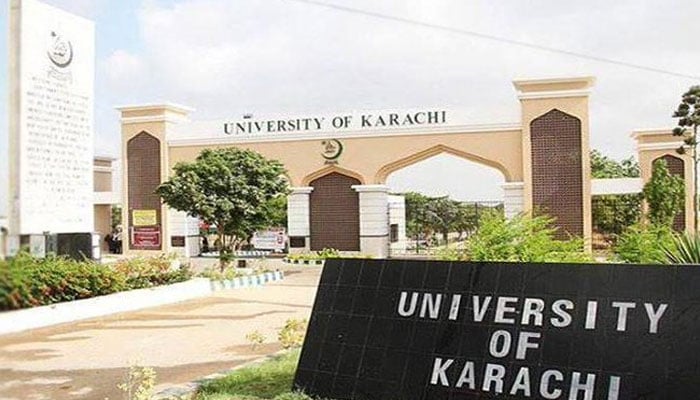Karachi University signs two MoUs
The University of Karachi’s (KU) Office of Research, Innovation, and Commercialization (ORIC) on Friday inked memorandums of understanding (MoUs) with two different organisations to enhance research in the field of biomedicine and promote entrepreneurial culture.
The first MoU was signed with the Organization of Pakistani Entrepreneurs of North America (OPEN) and Transformation International Society (TIS) to provide opportunities to students for skill development, start-up culture, training and dissemination of knowledge on long-term and non-commercial bases.
All the parties under the MoU agreed to work together to provide business facilitation support programs, help build primary linkages with the commercial world, and hold programmes by business counsellors to share best practices, provide leadership and training opportunities for entrepreneurs and business owners.
The signatories to the MoU agreed to build skills and capacity of entrepreneurs to help them start and expand their businesses, and provide support to them in transforming business ideas from bench to a marketable product.
KU Vice Chancellor Prof Dr Khalid Mahmood Iraqi, OPEN President Dr Farhan Essa, TIS Founder Dr Muhammd Imran Yousuf and ORIC Director Prof Dr Aliya Rehman signed the MoU. Prof Dr Farah Iqbal and Dr Muhammad Asim has been appointed as the focal person and co-coordinator of the programme. The second MoU was inked between the KU and the Advance Educational Institute and Research Center (AEIRC) to establish a healthy research relationship and carry out joint biomedical research.
According to the MoU, both parties agreed to encourage, develop and facilitate mutually beneficial cooperative activities including the implementation of the Sustainable Development Goals adopted by the United Nations General Assembly to ensure healthy lives and promote wellbeing for all through achieving quality education, gender equality, and sustainable cities and communities.
Under the MoU, the exchange of scientists and researchers would take place and joint and collaborative scientific research projects would be carried out. Both parties agreed to engage young scientists and researchers in different training programmes in addition to holding joint workshops and projects.
-
 King Charles, Princess Anne, Prince Edward Still Shield Andrew From Police
King Charles, Princess Anne, Prince Edward Still Shield Andrew From Police -
 US Set To Block Chinese Software From Smart And Connected Cars
US Set To Block Chinese Software From Smart And Connected Cars -
 Carmen Electra Says THIS Taught Her Romance
Carmen Electra Says THIS Taught Her Romance -
 Leonardo DiCaprio's Co-star Reflects On His Viral Moment At Golden Globes
Leonardo DiCaprio's Co-star Reflects On His Viral Moment At Golden Globes -
 SpaceX Pivots From Mars Plans To Prioritize 2027 Moon Landing
SpaceX Pivots From Mars Plans To Prioritize 2027 Moon Landing -
 King Charles Still Cares About Meghan Markle
King Charles Still Cares About Meghan Markle -
 J. Cole Brings Back Old-school CD Sales For 'The Fall-Off' Release
J. Cole Brings Back Old-school CD Sales For 'The Fall-Off' Release -
 GTA 6 Built By Hand, Street By Street, Rockstar Confirms Ahead Of Launch
GTA 6 Built By Hand, Street By Street, Rockstar Confirms Ahead Of Launch -
 Funeral Home Owner Sentenced To 40 Years For Selling Corpses, Faking Ashes
Funeral Home Owner Sentenced To 40 Years For Selling Corpses, Faking Ashes -
 Why Is Thor Portrayed Differently In Marvel Movies?
Why Is Thor Portrayed Differently In Marvel Movies? -
 Dutch Seismologist Hints At 'surprise’ Quake In Coming Days
Dutch Seismologist Hints At 'surprise’ Quake In Coming Days -
 Australia’s Liberal-National Coalition Reunites After Brief Split Over Hate Laws
Australia’s Liberal-National Coalition Reunites After Brief Split Over Hate Laws -
 DC Director Gives Hopeful Message As Questions Raised Over 'Blue Beetle's Future
DC Director Gives Hopeful Message As Questions Raised Over 'Blue Beetle's Future -
 King Charles New Plans For Andrew In Norfolk Exposed
King Charles New Plans For Andrew In Norfolk Exposed -
 What You Need To Know About Ischemic Stroke
What You Need To Know About Ischemic Stroke -
 Shocking Reason Behind Type 2 Diabetes Revealed By Scientists
Shocking Reason Behind Type 2 Diabetes Revealed By Scientists




